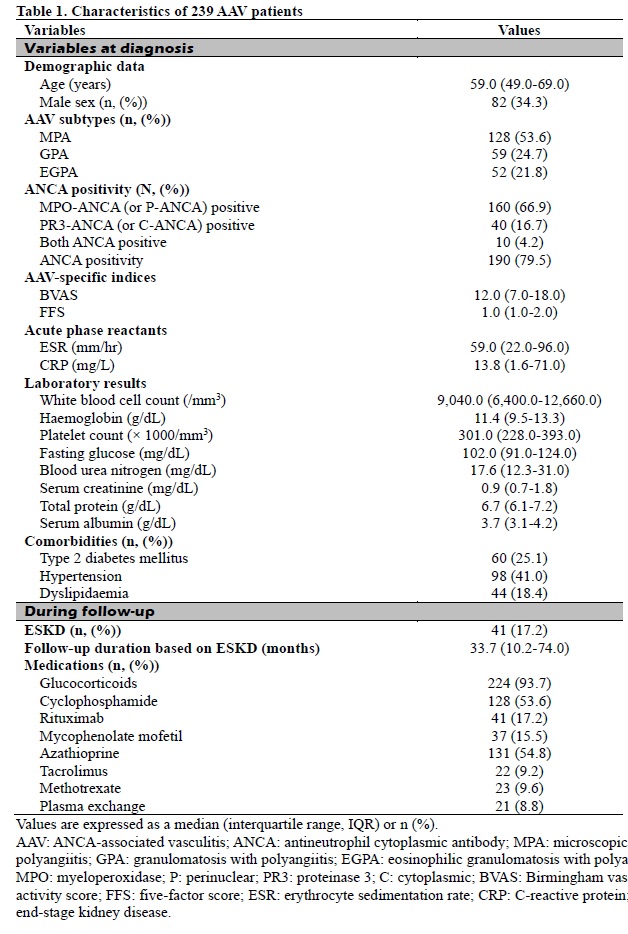Session Information
Session Type: Poster Session C
Session Time: 10:30AM-12:30PM
Background/Purpose: This study aimed to develop a simple, robust, and ethnoregion-specific index for predicting progression to end-stage kidney disease (ESKD) in Korean patients with antineutrophil cytoplasmic antibody (ANCA)-associated vasculitis (AAV).
Methods: Baseline data from 239 Korean patients with AAV enrolled in a tertiary hospital cohort were analyzed to identify independent predictors of ESKD using univariable and multivariable Cox proportional hazards models. The SHIPE index was constructed by summing the highest tertiles of the identified predictors: Five-Factor Score (FFS ≥2) and serum creatinine (≥1.3 mg/dL), with 1 point assigned to each criterion met. Cumulative ESKD-free survival rates across SHIPE index scores were compared using Kaplan-Meier analysis.
Results: A SHIPE index score of 2 was significantly associated with lower cumulative ESKD-free survival rate compared to scores of 0 or 1 (P< 0.001). By integrating two independent predictors, the SHIPE index provides a simple yet effective tool for risk stratification, demonstrating greater robustness against variability in single predictors such as serum creatinine. This index demonstrated clinical utility, providing a straightforward method for identifying high-risk patients in real-world settings.
Conclusion: The SHIPE index is a novel, robust, and convenient tool for predicting ESKD progression in Korean patients with AAV. This study introduces a practical framework for developing tailored prediction indices that can be adapted for diverse ethnic and regional populations. Its simplicity and practical applicability make it well-suited for routine clinical use. Future prospective studies are needed to validate the SHIPE index in larger, multi-ethnic cohorts and ensure its broader applicability.
 Table 1. Characteristics of 239 AAV patients
Table 1. Characteristics of 239 AAV patients
.jpg) Figure 1. The SHIPE index for AAV patients
Figure 1. The SHIPE index for AAV patients
.jpg) Figure 2. Comparison of three predictors — FFS, serum creatinine, and SHIPE index — for ESKD
Figure 2. Comparison of three predictors — FFS, serum creatinine, and SHIPE index — for ESKD
To cite this abstract in AMA style:
DO H, Lee L, Ha J, Song J, Park Y, Lee S. The SHIPE index: A tertile-based approach to predict end-stage kidney disease in ANCA-associated vasculitis [abstract]. Arthritis Rheumatol. 2025; 77 (suppl 9). https://acrabstracts.org/abstract/the-shipe-index-a-tertile-based-approach-to-predict-end-stage-kidney-disease-in-anca-associated-vasculitis/. Accessed .« Back to ACR Convergence 2025
ACR Meeting Abstracts - https://acrabstracts.org/abstract/the-shipe-index-a-tertile-based-approach-to-predict-end-stage-kidney-disease-in-anca-associated-vasculitis/
